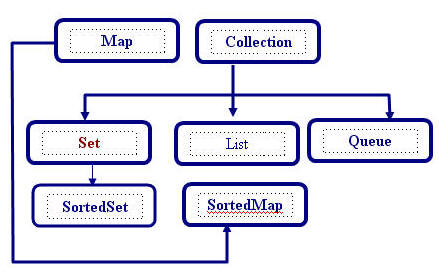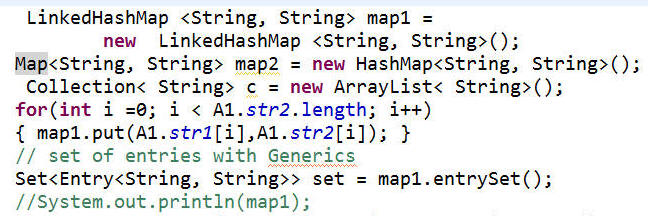The frame work contains
- Interfaces:

- Implementations: The aggregated objects are being inherited in a class that implements the interface as a part of polymorphism.
- Algorithms:
- Initialization Patterns:

- List<String> list = new ArrayList<String>(c);
- LinkedHashMap <String, String> map1 =
new LinkedHashMap <String, String>();
Set Interface : Can't have duplicate element,Set Implementation: HashSet, TreeSet, LinkecHashSet.HashSet: stores elements in HashTable, has no order of iteration.TreeSet : orders element with their valuesLinkedHashSet: follow the order of Insertions values
List— an ordered collection (sometimes called a sequence).Queue— a collection used to hold multiple elements prior to processing.- Map If you've used
Hashtable, you're already familiar with the basics ofMap. Also see The Map Interface section from Oracle's site.
| Interfaces | Implementations | ||||
|---|---|---|---|---|---|
| Hash table | Resizable array | Tree | Linked list | Hash table + Linked list | |
Set |
HashSet |
TreeSet |
LinkedHashSet |
||
List |
ArrayList |
LinkedList |
|||
Queue |
|||||
Map |
HashMap |
TreeMap |
LinkedHashMap |
||
| Interface Type | Implemented by |
| Set |
HashSet |
| SortedSet |
TreeSet |
| List |
Vector |
| Queue |
PriorityQueue |
| Map |
Hashtable |
| SortedMap |
TreeMap |
| Method Summary | ||
|---|---|---|
boolean |
add(E e)
Appends the specified element to the end of this list (optional operation). |
|
void |
add(int index,
E element) Inserts the specified element at the specified position in this list (optional operation). |
|
boolean |
addAll(Collection<?
extends
E> c) Appends all of the elements in the specified collection to the end of this list, in the order that they are returned by the specified collection's iterator (optional operation). |
|
boolean |
addAll(int index,
Collection<? extends
E> c) Inserts all of the elements in the specified collection into this list at the specified position (optional operation). |
|
void |
clear() Removes all of the elements from this list (optional operation). |
|
boolean |
contains(Object o)
Returns true if this list contains the specified element. |
|
boolean |
containsAll(Collection<?> c)
Returns true if this list contains all of the elements of the specified collection. |
|
boolean |
equals(Object o)
Compares the specified object with this list for equality. |
|
E |
get(int index) Returns the element at the specified position in this list. |
|
int |
hashCode() Returns the hash code value for this list. |
|
int |
indexOf(Object o)
Returns the index of the first occurrence of the specified element in this list, or -1 if this list does not contain the element. |
|
boolean |
isEmpty() Returns true if this list contains no elements. |
|
Iterator<E> |
iterator() Returns an iterator over the elements in this list in proper sequence. |
|
int |
lastIndexOf(Object o)
Returns the index of the last occurrence of the specified element in this list, or -1 if this list does not contain the element. |
|
ListIterator<E> |
listIterator() Returns a list iterator over the elements in this list (in proper sequence). |
|
ListIterator<E> |
listIterator(int index) Returns a list iterator of the elements in this list (in proper sequence), starting at the specified position in this list. |
|
E |
remove(int index) Removes the element at the specified position in this list (optional operation). |
|
boolean |
remove(Object o)
Removes the first occurrence of the specified element from this list, if it is present (optional operation). |
|
boolean |
removeAll(Collection<?> c)
Removes from this list all of its elements that are contained in the specified collection (optional operation). |
|
boolean |
retainAll(Collection<?> c)
Retains only the elements in this list that are contained in the specified collection (optional operation). |
|
E |
set(int index,
E element) Replaces the element at the specified position in this list with the specified element (optional operation). |
|
int |
size() Returns the number of elements in this list. |
|
List<E> |
subList(int fromIndex, int toIndex) Returns a view of the portion of this list between the specified fromIndex, inclusive, and toIndex, exclusive. |
|
Object[] |
toArray() Returns an array containing all of the elements in this list in proper sequence (from first to last element). |
|
|
toArray(T[] a) Returns an array containing all of the elements in this list in proper sequence (from first to last element); the runtime type of the returned array is that of the specified array. |
|